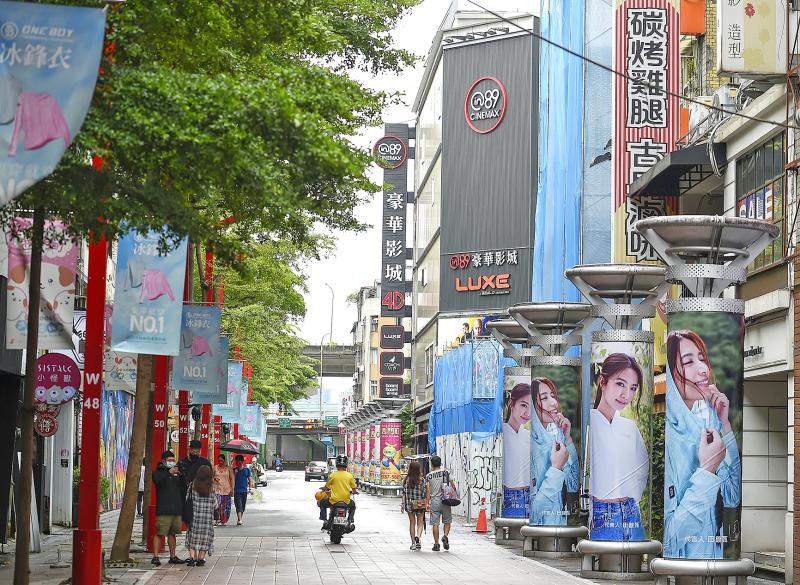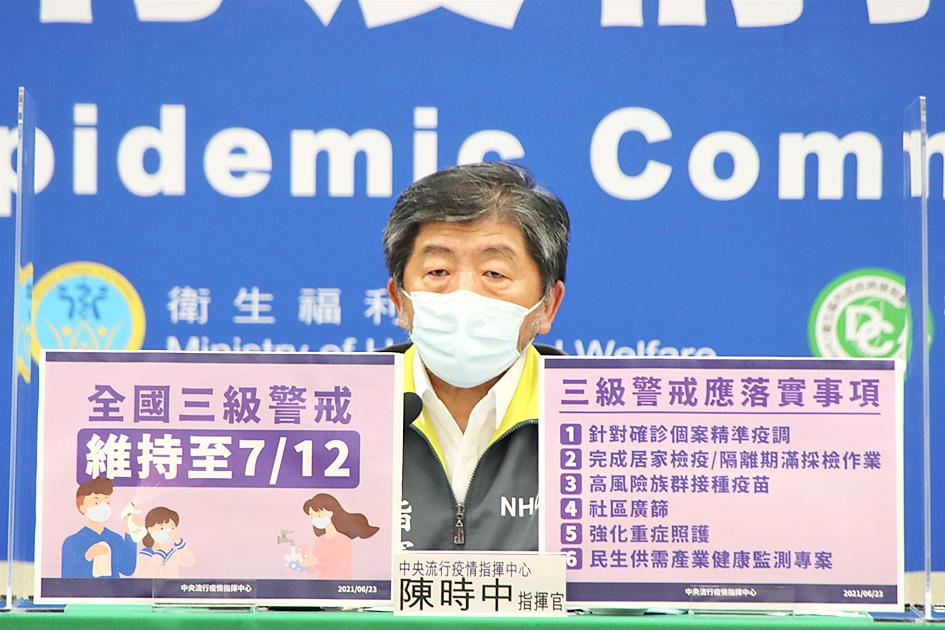The Central Epidemic Command Center (CECC) yesterday announced that a level 3 COVID-19 alert has been extended by two weeks until July 12, while it reported 104 locally transmitted cases and 24 deaths.
The alert was first issued in Taipei and New Taipei City on May 15, and expanded nationwide on May 19. It was originally due to end on Monday next week, but it was extended for the third time yesterday.
“The level 3 alert will continue to be implemented until July 12,” Minister of Health and Welfare Chen Shih-chung (陳時中) told a news conference at noon.

Photo: Chen Chih-chu, Taipei Times
“Although the situation has improved during the alert period, it has not reached our goal yet,” said Chen, who heads the CECC. “Let us all continue to endure it for two more weeks and do our best to hopefully achieve a more stable situation after July 12.”
All of the restrictions remain the same, but six measures require enhanced implementation, Chen said.
The six measures include “conducting precise contact tracing” to identify close contacts and place them under isolation as soon as possible, he said, adding that it became more difficult to implement precise contact tracing and prompt isolation when local infections rapidly increased last month, but the situation has improved.

Photo courtesy of the Central Epidemic Command Center
Immediate isolation can reduce virus transmission within households, but it can be difficult to cut chains of infection if contact tracing to identify close contacts at workplaces or in social circles is not thorough, he said.
The second measure — mandatory testing of people ending home isolation or quarantine — was announced on Tuesday, while the third is accelerating vaccinations in high-risk groups to reduce infections, serious complications and deaths, he said.
The fourth is “wide screening,” which includes performing tests at local community stations or at companies, as well as the use of at-home test kits, which came on the market yesterday, he said.
The fifth measure is “improving treatment of serious cases of COVID-19,” including importing medication and having experts discuss treatment methods regularly, he said, adding that the last measure is launching a special health monitoring program for the daily necessities sector, mainly markets.
Reporters asked whether the alert extension was due to cluster infections that have been reported at several venues in Taipei in the past week, including 54 cases linked to Taipei Agricultural Products Marketing Co (台北農產運銷) and 47 cases at a long-term care center in Shilin District (士林).
The clusters were considered, but the decision was “not directly linked to them,” Chen said, although he added that contact tracing in response to the clusters was not thoroughly implemented.
Hopefully, accurate contact tracing and prompt isolation would be improved in the next two weeks, he said.
The CECC reported 104 local infections, 45 males and 59 females aged from under five to over 90, whose symptoms emerged between June 10 and Tuesday.
New Taipei City reported 45 cases, Taipei 22, Hsinchu County and Kaohsiung nine each, Taoyuan seven, Miaoli County four, Keelung three, Yilan County two, and Changhua, Nantou and Pingtung counties one each, CECC data showed.
Of the 24 deaths, 15 were men and nine were women, with their ages ranging from 40 to 90, the data showed.
All but one of them had underlying health conditions, the data showed.
Centers for Disease Control Deputy Director-General Chuang Jen-hsiang (莊人祥), the CECC’s spokesperson, said that six people from Taiwan tested positive for COVID-19 upon arrival in Xiamen, China.
Four of them were confirmed cases in Taiwan and had been released from isolation, while the other two tested negative more than once in Taiwan, Chuang said.
The CECC would conduct contact tracing to identify their close contacts in Taiwan, he said.

‘FORM OF PROTEST’: The German Institute Taipei said it was ‘shocked’ to see Nazi symbolism used in connection with political aims as it condemned the incident Sung Chien-liang (宋建樑), who led efforts to recall Democratic Progressive Party (DPP) Legislator Lee Kun-cheng (李坤城), was released on bail of NT$80,000 yesterday amid an outcry over a Nazi armband he wore to questioning the night before. Sung arrived at the New Taipei City District Prosecutors’ Office for questioning in a recall petition forgery case on Tuesday night wearing a red armband bearing a swastika, carrying a copy of Adolf Hitler’s Mein Kampf and giving a Nazi salute. Sung left the building at 1:15am without the armband and apparently covering the book with a coat. This is a serious international scandal and Chinese

A US Marine Corps regiment equipped with Naval Strike Missiles (NSM) is set to participate in the upcoming Balikatan 25 exercise in the Luzon Strait, marking the system’s first-ever deployment in the Philippines. US and Philippine officials have separately confirmed that the Navy Marine Expeditionary Ship Interdiction System (NMESIS) — the mobile launch platform for the Naval Strike Missile — would take part in the joint exercise. The missiles are being deployed to “a strategic first island chain chokepoint” in the waters between Taiwan proper and the Philippines, US-based Naval News reported. “The Luzon Strait and Bashi Channel represent a critical access

COUNTERINTELLIGENCE TRAINING: The ministry said 87.5 percent of the apprehended Chinese agents were reported by service members they tried to lure into becoming spies Taiwanese organized crime, illegal money lenders, temples and civic groups are complicit in Beijing’s infiltration of the armed forces, the Ministry of National Defense (MND) said in a report yesterday. Retired service members who had been turned to Beijing’s cause mainly relied on those channels to infiltrate the Taiwanese military, according to the report to be submitted to lawmakers ahead of tomorrow’s hearing on Chinese espionage in the military. Chinese intelligence typically used blackmail, Internet-based communications, bribery or debts to loan sharks to leverage active service personnel to do its bidding, it said. China’s main goals are to collect intelligence, and develop a

PERSONAL DATA: The implicated KMT members allegedly compiled their petitions by copying names from party lists without the consent of the people concerned Judicial authorities searched six locations yesterday and questioned six people, including one elderly Chinese Nationalist Party (KMT) member and five KMT Youth League associates, about alleged signature forgery and fraud relating to their recall efforts against two Democratic Progressive Party (DPP) legislators. After launching a probe into alleged signature forgery and related fraud in the KMT’s recall effort, prosecutors received a number of complaints, including about one petition that had 1,748 signatures of voters whose family members said they had already passed away, and also voters who said they did not approve the use of their name, Taipei Deputy Chief Prosecutor